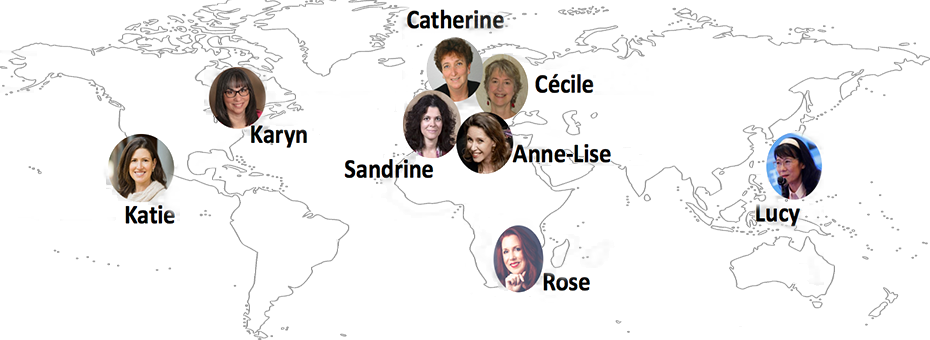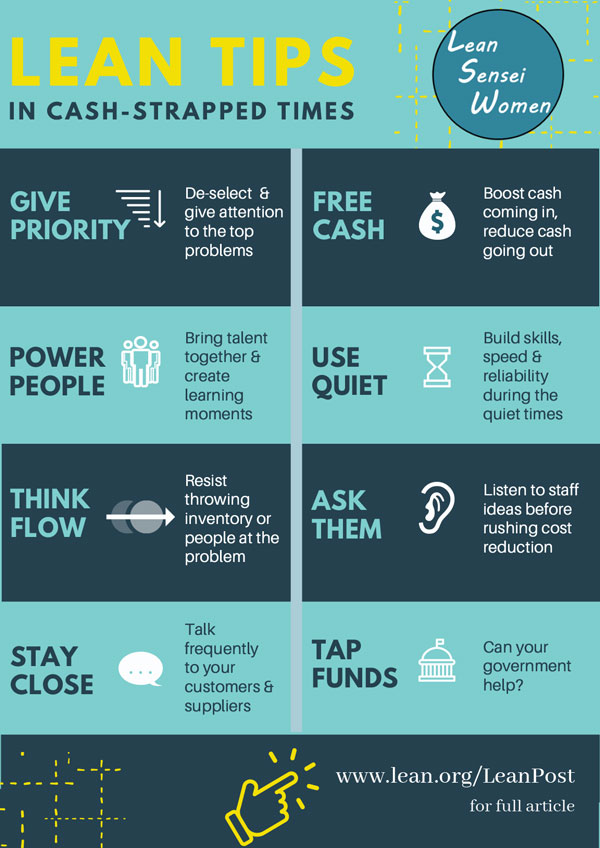(This article was primarily authored by Rose Heathcote, with input and support from the Lean Sensei Women. The Lean Sensei Women are a group of experienced lean practitioners who take turns to discuss business and world topics with lean lenses.)
Extraordinary times often call for ordinary responses. For in the time of unprecedented crises created by the Covid-19 challenge, a handful of core lean practices can serve as the most productive short- and long-term responses of mindful managers. How we handle the crisis is a defining moment. How we prepare for life after the crisis is vital.
To help you navigate, we’ve gathered Lean insights from various businesses around the globe. These common-sense tips help beyond crisis mode. Please note that there is a significant if subtle difference between random, knee-jerk cost-cutting and thoughtful cost reduction. As you and your team focus on this work, we appeal to you to act for the protection of employee stability and well-being, improvement of quality and the preservation of customer relationships.
GIVE PRIORITY
If it feels as though there is too much going on, then there probably is. Do a sanity check on priorities and slice out the not-so-important parts, allowing you the time and space to deal with a handful of essential items. This could mean deferring projects as well. With many challenges raining on employees, filter the noise by stacking which problems to tackle first, why and how. Prioritize the safety of customers and employees while getting closer to the customer to hear and respond to what they value now. Always ask how quality can be improved, cash preserved, and products developed that sell (not that you like). Then give teams the time and space to experiment. Jumping between priorities causes more confusion and creates waste, so sticking with it, illustrating constancy of purpose, and offering your support is essential.
EMPOWER PEOPLE
More than ever, we need the collective talent of our teams. Drawing on their experience and diversity to build new products, enter new markets, solve big issues. Frame every setback as a learning moment. How we empower people to bring ideas forward, without fearing ridicule or failure, is a leader differentiator. How we guide them through each problem in a scientific way fuels the learning and outcomes. Help them grasp how things look, test out their ideas, implement quickly…all in short learning cycles. It may feel you’re losing the chance for deep thinking, but waiting for perfection is a more significant hindrance. Supporting them means not leaving them hanging. Above all, reflect with your people, help them succeed.
THINK FLOW
It’s simple human nature, and the path of least resistance, to add more people when we’re unable to cope or to build up inventories just-in-case. It’s harder to map the journey the customer or product takes, break the problem down into its hidden causes, and lay out an array of countermeasures. Gather your team and help them decongest the flow by eliminating one waste and its causes at a time. This approach is harder but builds consensus and understanding of the problems. It opens minds to new possibilities. The latter has longevity in learning and lasting improvements. With value streams visualized and flow opportunities exposed, you can take it a step further connecting the flows to genuine customer demand. Once this connection is made, problems become more visible and the learning moments amplify.
STAY CLOSE
Our problems are not unique to us. Entire supply chains feel the pain. Opening communication channels up and down the line is critical. Chat with your customers, stay close to them and their issues. How can you help them? Keep your suppliers up to date on where you stand and your needs, while working on problems that benefit everyone. Collaborate for everyone’s benefit.
LIBERATE CASH
Life after Covid-19 will be hard, and freeing up cash will be your advantage. If we’re not selling products that are needed, nor reducing unnecessary waste, nor conserving our resources, the triple-bottom-line suffers. And everyone is feeling the pinch so partners may be more forgiving towards special requests making it an excellent time to negotiate. Boost cash coming in and thoughtfully remove unnecessary cost by such steps as:
- Tackle the cost and causes of poor quality, claims and penalties.
- Reduce energy consumption.
- Purchase in smaller batches.
- Offer deals on slow movers.
- Defer unnecessary spending or investment.
- Offer discounts, free delivery, online deals.
- Less overtime and outsourcing, more cross-skilling.
- Make good use of space before paying for more.
- Defer landlord escalations or payments.
- Adjust payment plans with suppliers and customers.
- Chat to the bank about loan repayments and rates.
- Offer settlement discounts.
USE QUIET
The CEO of a local manufacturing firm explained how the quiet time forced him to put his safety boots on and spend more time on the floor. He realized he was spending far too much time in his ivory tower and not enough time understanding the frontline issues and the support they needed. He started using his quiet time to develop his people, do shutdown maintenance, run interference on unnecessary projects and save big money on procurement by driving 5S. It’s a terrific time to build critical skills and enable staff to take up online learning. It’s a perfect opportunity to develop machine durability and reliability or take on that low-cost automation project, freeing up people-time for improvement or more value-adding tasks. In his case, he also expanded his product range. He offloaded those not doing well, ultimately prompting the need for flexibility – faster setups and quick fasteners (cams, clamps, fewer bolts and mechanization). Relish the quiet time.
ASK THEM
For some, retrenchment or winding up a business appears to be the only path. We see it all over the news. The counter-argument is: have we done everything we can? Perhaps the difficult decision already loomed before Covid-19 and the crisis hammered the last nail in the coffin. But, could mobilizing staff and incentivizing them to come up with creative plans to address the financial issues help? Let them come to you about salary adjustments, unpaid leave, extra hours, learning new skills. Talk fairly about deferring bonuses and increases. Most of all, set an example by doing the same. Pulling the rug out from under the frontline while the upper echelon still draws a salary, is a difficult pill to swallow.
TAP FUNDS
Some governments have made support available in the form of special funds, deferred payments, incentives and tax breaks. Deferred payments where future prospects are solid can be a great help to cash flow.
This is a challenging time. It may be what we need to do better than before with powerful learning benefits that far outweigh financial improvement. An opportunity to reflect on areas we’ve perhaps not considered previously. Those prepared to reflect, empathize with their staff and customers, recalibrate, consider purpose and priorities, cut their cloth, problem-solve in short cycles, lean on the team to experiment and improve, will work through and out the crisis, having learned and evolved for the better.
Thankfully, post-lockdown customers will still require products and services, although consumer preferences, affordability and trends will shift, and new needs will emerge. The burning platform is a real test of our potential for creativity and endurance, and perhaps business unusual will never return to business usual to which we’re accustomed. Still, with focused effort, it may just become ‘business better’.
We’d love to hear your ideas and what you’re doing now to survive and thrive while keeping an eye on long-term sustainability. Please add your comments below to help fellow Lean Thinkers. We are all in this together.
Click image for larger view.
AUTHOR BIO: LEAN SENSEI WOMEN
Coming from different continents, horizons and professions, the individuals who form Lean Sensei Women are all recognized lean Senseis, who help companies and organizations build sustainable growth through lean management. They believe in the development of people, respectful of both teams and environment, with a view to produce more value for customers and to society.
Catherine Chabiron: Board Member, Institut Lean France. Author of Notes from the Gemba in Planet Lean and executive lean coach.
Rose Heathcote: Author of Clear Direction and Making a Difference. Rose is personally dedicated to transformation in Africa, bringing change to organisations for the benefit of employees, customers, shareholders and the environment.
Lucy Liu: Lean leadership and organizational transformation coach with 28 years of working experience with Toyota Australia, starting at the shopfloor and including leading TPS office and manufacturing capability development. Author of Building An Organizational Learn Architecture for Strategic Renewal.
Sandrine Olivencia: Lean sensei and member of Institut Lean France. Specialist in Obeya and product development expert for the digital world.
Cécile Roche: Lean sensei, member of the Institut Lean France, Lean Director of the Thales Group, and author of several books, in particular on Lean in Engineering.
Anne Lise Seltzer: Member of Institut Lean France. Lean Coach in Services and Support functions. Trainer for Lean & Learn at SOL France (learning organization).
Katie Anderson: Katie Anderson is a lean leadership coach and performance improvement specialist with over 15 years of experience. Katie is passionate about developing people’s leadership, problem solving and coaching capabilities to support continuous improvement and organizational transformation.
Karyn Ross: An author of five books including The Toyota Way to Service Excellence: Lean Transformation in Service Organizations, Karyn is an artist and coach on a mission to “Help People Improve the World”.






